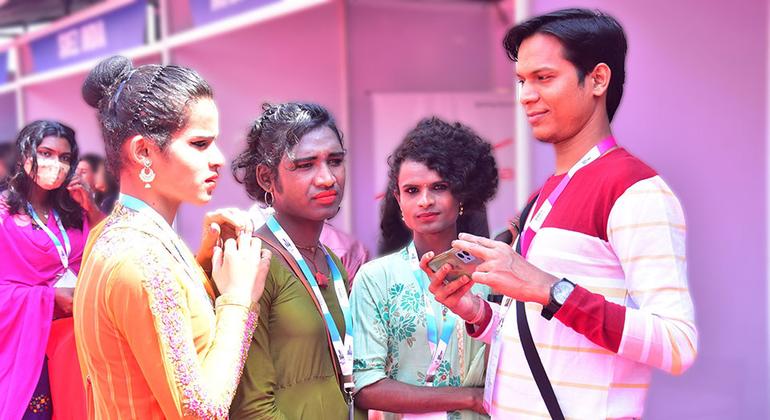“Many of us take our gender identity for granted, but for many children it is not so easy,” said Mahesh Mahalingam, the UNAIDS Director of Communications and Global Advocacy. “It’s a matter of daily survival, a daily struggle. Children all around the world must be supported in expressing their identity freely.”
Stigma, discrimination, and criminalization tend to make transgender and gender-diverse people invisible, with extreme forms of discrimination leading to even the denial of the existence of gender-diverse people, UNAIDS said.
Going global
The Unbox Me campaign hopes to change that. Created in India, it is now going global, UNAIDS said.
The initiative is part of an ongoing UNAIDS collaboration with advertising agency FCB India.
“In India, children usually have a box which they use to store their most precious possessions, but in the case of transgender children they need to hide their box of treasures, since some of their most precious possessions don’t fit the gender norm that society expects them to conform to,” said Swati Bhattacharya, FCB India’s creative chairperson.
Restoring treasure boxes
To raise awareness, the campaign has launched a film and recreated the childhood treasure boxes of transgender adults. The contents, from a string of beads to a razor, provide rich conversation starters.
As part of its #SeeMeAsIAm campaign to raise awareness, the UNAIDS-FCB partnership released The Mirror, a short film about a young boy looking in the mirror and dressing up as a woman. Building on that film, Unbox Me seeks to bring home the reality of life for transgender children who are denied their true identity, UNAIDS said.
Currently, more than 90 per cent of transgender people in India leave their homes or are thrown out by the time they reach 15, UNAIDS reported. Inevitably, many live on the street with no money or education, often relying on sex work.
Call for inclusion
“Unbox Me is about giving transgender children visibility; it is a call for inclusion and acceptance,” UNAIDS said.
In India, the Unbox Me campaign has garnered support among such prominent celebrities as film director Zoya Akhtar and television anchor Barkha Dutt as well as the education community. Teachers in many schools across India are using the boxes featured in the campaign to start conversations to raise awareness about gender identity.
The Mirror
Decriminalize transgender people
Transgender people around the world are often marginalized and experience discrimination, and violence, UNAIDS reported. As a result, transgender people have a 34 times greater risk of acquiring HIV than other adults.
UNAIDS reported that more than 20 countries in the world criminalize or prosecute transgender people. For example, early in the COVID-19 response, some governments instituted gender-specific mobility days during lockdowns, which resulted in arrests against transgender people out on the “wrong” day, the agency said.
UNAIDS works closely with the transgender community, civil society organizations and governments all around the world to decriminalize transgender people, secure their rights and ensure that they have access to health, education, and social protection and that they are protected from abuse and exploitation.



